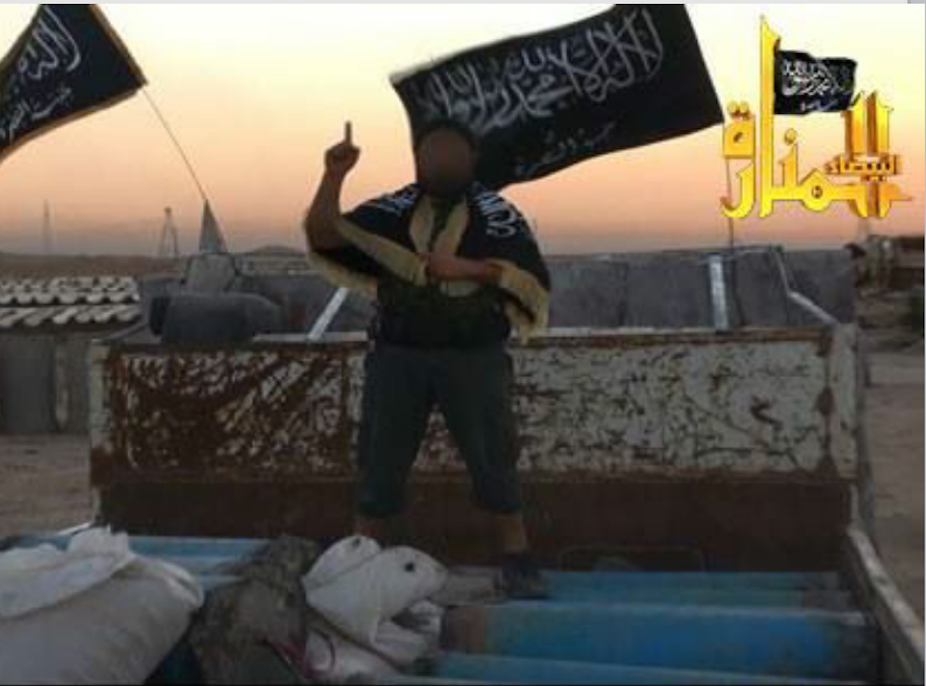A married Queenslander using the nom de guerre “Abu Asma al-Australi” featured as a suicide bomber in a promotional video released by the Syrian al-Qaeda affiliate Jahbat al-Nusra earlier this month.
He was hardly the first “al-Australi” involved in the Syrian civil war. A 30-year old married Melbourne bricklayer who operated under the alias “Abu al-Walid al-Australi” has also been celebrated as a martyr in al-Nusra propaganda videos since he was killed late last year. ASIO believes that there are at least 200 Australians who have gone to fight in Syria, more than double the number believed from any other Western country.
But why has Australia’s contribution to the Syrian War been so large both in absolute numbers and relative to its population size?
Australians have fought abroad as insurgents in a number of other civil wars, although never as the largest group among foreign fighters. However, we can examine these historical cases for data about why foreign fighters sign up, what their recruiters tell them they are fighting for, and the impact that these individuals have on their wars and their societies at home.
In my new book Foreign Fighters, I examined transnational recruitment by insurgent groups worldwide over the past 200 years. Approximately one in five rebel groups have augmented their forces by persuading people outside their country to join the fight.
In different cases, local insurgents share common ties of religion, ethnicity or ideology with their foreign target audiences, but they employ the same recruitment strategy. In every case, recruiters claim - sometimes accurately - that the entire identity group faces a threat to its existence and the recruit must fight in the name of both duty and self-interest.
They typically reach potential recruits through institutions or representatives of the community, whether houses of worship, union meetings or summer camps. The most receptive in the audience already strongly identify with the group, but tend to be marginalised in the broader society, often because they are members of a minority group.
Other motives, such as adventure-seeking, profit, or ego-gratification might prompt individuals to sign up, but they are consistently told that the situation is dire. And it is the foreign fighters who engage in most of the highly aggressive combat and suicide operations, in part because they believe that the conflict must be won at all costs for their people.
These descriptions reflect the Australian recruits on both sides of the Spanish Civil War in the 1930s. There were leftists and unionists who believed that fascism had to be halted and so fought with the Communists, and Catholics who were told that Communism was set to obliterate the Catholic Church and joined the fascists in response.
They are also true of the Jewish Australian volunteers in the 1948 Israeli War of Independence who were told that their help was needed to establish a homeland or else the Holocaust would inevitably resume. Successor organisations continue to recruit diaspora Jews worldwide using a defensive frame even though they are no longer insurgents. Quite possibly, Ben Zygier (Prisoner X) signed up for the same reason.

The portrayal of a global Muslim community under threat has also been applied by jihadis to every civil war since Afghanistan in the 1980s. It brought recruits to Bosnia, including David Hicks. There were, however, foreign fighters on all sides of the Yugoslavian wars of the 1990s, and Organisation for Security and Co-operation in Europe (OSCE) staff in Croatia in the 1990s were acquainted with the local expression “kangaroo villages” to describe towns that had been repopulated after ethnic cleansing by transplants from Australia.
But it is the narrative of a single global war against Muslims - being fought on every battlefield from Kosovo to the Philippines - that has made it easy for al-Qaeda branches and like-minded groups to recruit for jihad. It has been effective in Somalia, where Somali-Australian and Lebanese-Australian volunteers learned the skills that they hoped to employ in the thwarted 2009 plot to blow up the Holsworthy Army Barracks.
The confrontation in Syria, and to an extent in Iraq before it, requires a slightly different frame: that of Sunni Muslims being destroyed by Shia governments. That said, there are also Australian Shiite volunteers among the ranks of Hezbollah militants fighting for the Assad regime. Most likely, the particular ties of the Australian Lebanese community with its connections in the region facilitate easy access into Syria and give Australia its disproportionate presence in this conflict.

But this coincidence can have consequences. A study published earlier this year found that most jihadis prefer to go and fight on foreign battlefields, away from the constraints of their home societies. But among those who survive and return home with combat experience, about 10% become involved in militant activity in their countries of origin.
As the numbers of Australians fighting in Syria and elsewhere continues to mount, the odds that some will return home to continue the fight grow as well. Indeed, the Holsworthy plot was the attempted first case of blowback against a western country by foreign fighters in Somalia. The same transnational networks that permit recruitment and mobilisation make geographic distance irrelevant.
Stopping the outflow of foreign fighters is difficult, and intercepting them requires active surveillance and inevitable profiling. The best alternative in the long run is to try to build inclusive national and civic identities - if not Australian patriotism - so that alternate transnational identities do not matter enough to go to a distant war zone to kill and die for. This might be effected through national service, either military or in local community building programs like AmeriCorps in the United States.
But it is late in the day to do any such thing for Syria. The best option at this point is vigilance as the latest “al-Australis” return home, in some cases to become recruiters themselves.

